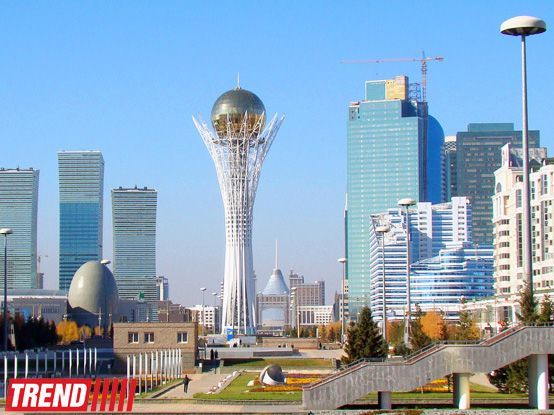Astana, Kazakhstan, Jan. 13
By Daniar Mukhtarov - Trend:
The Treaty on the Eurasian Economic Union is planned to be signed in 2014, Kazakh Vice-Minister of Economy and Budget Planning, Timur Zhaksylykov said at a briefing in Astana on Jan. 13.
He said the treaty's provisions are formed on the basis of codification of the contractual framework of the Customs Union and the Common Economic Space (CES).
"This document is very important for Kazakhstan, as it will define the basis of the state's foreign economic policy for many years to come," Zhaksylykov said.
He went on to add that the goal of Kazakhstan's participation in the Eurasian integration is the expansion of markets, attracting investment, including in the processing sector.
The growth of foreign direct investments (FDI) in Kazakhstan's manufacturing industry is an illustrative example. Since the establishment of the Customs Union the FDI in Kazakhstan's manufacturing industry increased by 88 percent - from $1.8 billion in 2009 to $3.4 billion in 2012. Alongside with this during the above mentioned period the total FDI increased by 34 percent - from $21.4 billion to $28.3 billion.
"In addition, the creation of the CES has provided additional opportunities for domestic business in reducing the transaction expenses and significant release of circulating assets, which can now be directed at business development," the deputy minister said.
He said each CES country has been implementing a unified tariff in the sphere of railway transportations since January 1, 2013 for the services on transportation of various types of cargos (export, import and intergovernmental).
Zhaksylykov also said unification of tariffs ensures the transparency of their use, helps to create equal competitive conditions for commodities and commodity producers.
"The volume of transportations conducted by Kazakh shippers through the territory of Russia and Belarus is about 17.2 million tons per year, while the volume of transportation of Russian and Belarusian goods on the territory of Kazakhstan stood at about 8.6 million tons in 2012. Therefore the tariff unification is particularly important for Kazakh shippers," he said.
Starting from January, 2014 Kazakh suppliers can participate in public procurements in Russia and Belarus.
The CES will provide Kazakh suppliers with an equal access to public procurements in other countries of the union, the vice minister said.
Market volume of public procurements of the partner countries in the CES in 2012 amounted to about $198 billion. For comparison - in 2012 the procurement market of Kazakhstan amounted to about $7.6 billion. Thus, the market of partner countries exceeds the domestic market by 26 times, giving a clear potential for the development of domestic goods producers and in general, business, Zhaksylykov said.
Industrial cooperation and development of agriculture are important components for the CES' functioning. A number of agreements have been reached within the CES framework, including: decision on industrial cooperation, provision of deepening of industrial cooperation, coordination of national industrial policies of the three countries.
Another agreement was also reached. It establishes that the state support for agriculture, that distorts trade, should not exceed the permissible level, fixed in the amount of 10 percent of GDP of agriculture.
This measure will provide favourable conditions for development of fair competition in the mutual trade in agricultural products of Kazakhstan, Belarus and Russia by equalizing volumes of subsidizing the three countries' agricultural sectors. Decisions were taken in respect of certain civilian passenger aircrafts and harvesters. The decisions fully take into account the interests of Kazakh producers of goods and services.
"The possibility of preferential import of aircraft in Kazakhstan has been extended till June 30, 2019. This will allow the national airlines to implement plans to modernize their fleet and increase the level of competitiveness in the global air transportations market," Zhaksylykov said.
He noted that an import quota of 774 units per year will be provided as a safeguard measure to protect the interests of domestic agricultural producers, with regards to harvesters imported into the common customs territory of the Customs Union. Kazakhstan's share in the import quota that is equal to 300 units will be taken into account.






